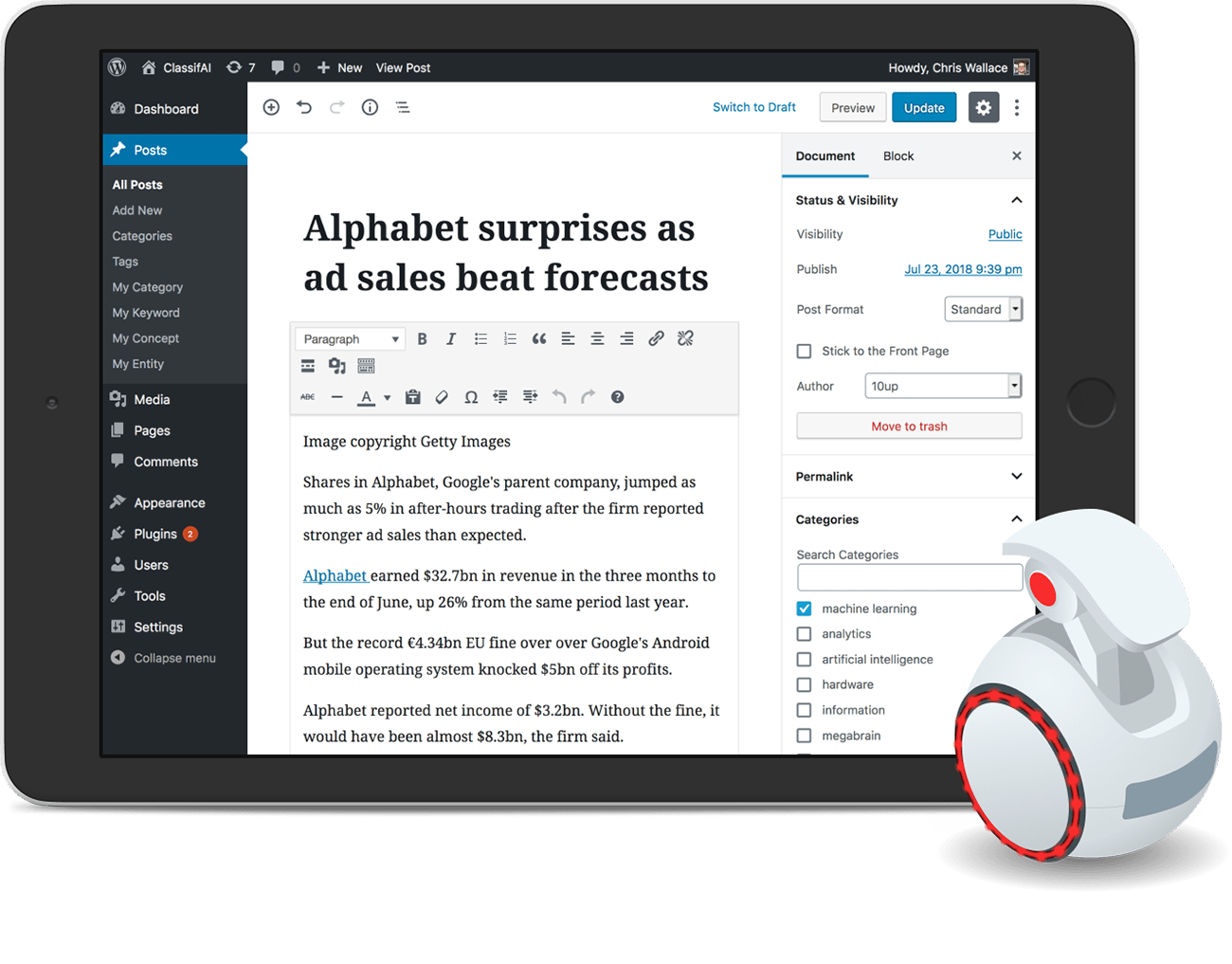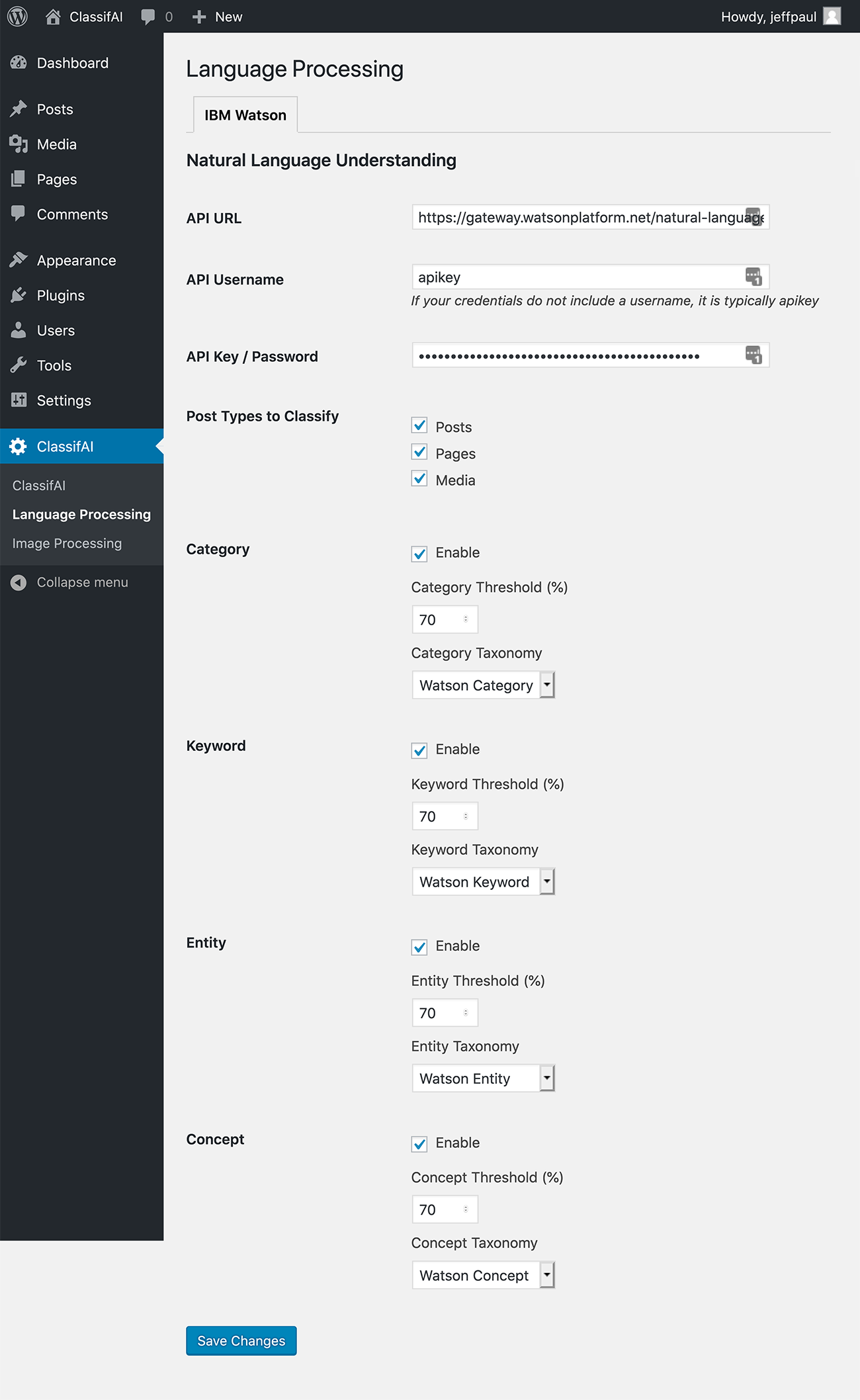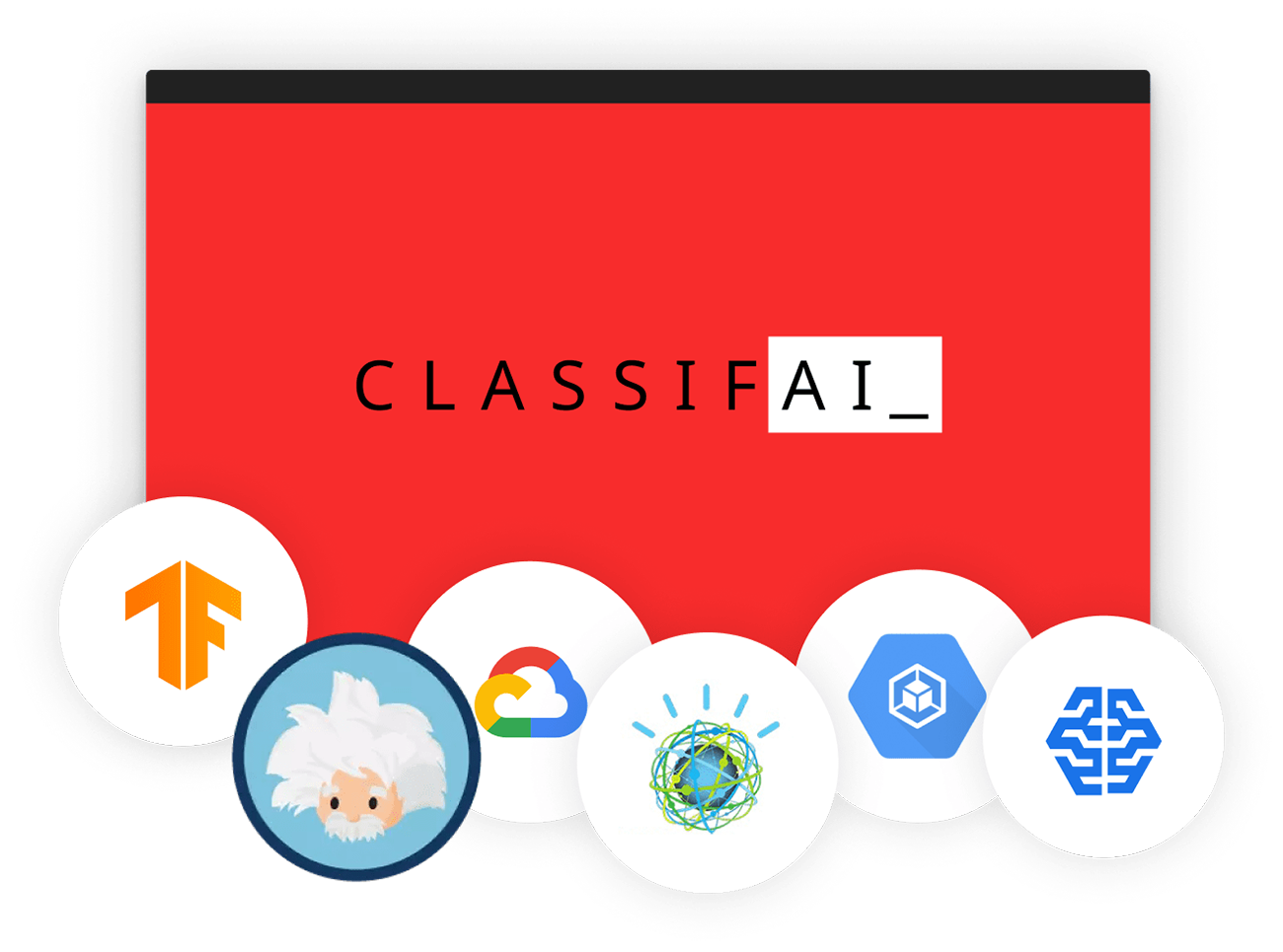ClassifAI Brings AI and Machine Learning Services to WordPress

Drive.ai uses artificial intelligence to create self-driving cars. OpenAI, a nonprofit research company backed by Elon Musk, created an artificial intelligence model called GPT2 that can generate text relevant to topic, tone, and feeling based on only a few words. Navigation services use artificial intelligence to decipher hundreds of thousands of data points to provide real-time traffic data.
Artificial intelligence (AI) and machine learning are revolutionizing technology and when applied to digital publishing, the opportunities available to streamline internal workflows, enhance visitor experiences, and increase revenue are endless.
Artificial Intelligence vs. Machine Learning
AI is the capability of a machine to imitate intelligent human behavior. Machine learning is a subset of AI with the ability to modify itself when exposed to more data; i.e. machine learning is dynamic and does not require human intervention to make certain changes.
Search engines like Google rely on AI and machine learning to “understand” what your content and site are about and how it should be ranked. But have you ever wondered if search engines interpret your content the same way you do? Or have you ever considered how these cutting edge technologies could be used to improve your content strategy or reduce resources?
These are the questions we’re asking at 10up as we look to the future of publishing technology and explore practical solutions that streamline editorial processes, increase audience engagement, and boost profits—solutions like our new plugin ClassifAI.
ClassifAI is a free, open-source plugin that leverages leading cloud-based services like IBM Watson and Microsoft Azure AI to augment WordPress-powered websites with Artificial Intelligence and Machine Learning technology.
With years of experience working with some of the largest digital content creators, 10up understands that AI and machine learning will play an important role in the future of content creation and website experiences and we’re committed to driving this technology forward in the WordPress community. Today we are excited to share merely the first steps for ClassifAI: automated content tagging and classification as well as the automatic creation of image ALT text.
How ClassifAI Works
ClassifAI is designed to be a connector that integrates external Cloud Based services from cutting edge innovators like Microsoft Azure and IBM Watson. Just sign up for any of the cloud services supported by ClassifAI, and add your credentials in the plugin’s settings screen to get started. At the time of writing, all of the supported services offer free tiers that will be more than sufficient for most real world use cases.

For content tagging, ClassifAI currently leverages IBM Watson, a cloud-based offering that includes a host of services and APIs— including language translation, tone analysis, and speech to text. The RESTful API IBM Watson uses for classifying text is called Natural Language Understanding (NLU). It examines the content passed to the API and returns proposed classifications it calls “features.” The Watson features most relevant in our initial release are Categories, Concepts, Entities, and Keywords, which can be used to assign categories, tags, or custom taxonomies to your content.
For image tagging and descriptions, ClassifAI uses Azure Cognitive Services, more specifically, its Computer Vision capabilities, a cloud-based product that makes it possible for apps and services to accurately identify, caption, index, moderate, and analyze content within images, videos, and digital ink. Computer Vision enables ClassifAI to extract rich information from images to categorize and process visual data—and automatically apply natural language captions to the alt-text field.
Automated Content Tagging and Classification
While assigning taxonomies to content types isn’t new to WordPress, until now this step in the editorial process has been managed manually, which is a daunting task if there is an inconsistent application of data across large editorial teams. ClassifAI automates this workflow, saves publishing teams time and effort, and provides a more “objective” assessment of your subject matter.
Search engines use AI to define and classify your content and the best way to discover how a searchbot like “googlebot” views your content is to have your own bot assess your content. Using a machine learning algorithm, ClassifAI evaluates your content and provides a list of relevant taxonomy terms. This objective data delivers critical insights into what your content is about that can be used to:
- Identify opportunities to improve existing content
- Ensure new content is focused, on topic, and aligned with your goals
- Improve content strategy to drive search engine optimization
A strong, consistent taxonomic structure also improves visitor experience by exposing high-value content archives. Better metadata can also improve internal search capabilities. When ClassifAI is paired with solutions like 10up’s open-source ElasticPress, publishers can deliver more relevant search results, contextual recommendations, and even personalized content suggestions.
Automated Image Definition and Accessibility
In the editorial process, image tagging is often overlooked due to time constraints, resourcing challenges, inconsistent training of writers and editors, and data not being visible on a site’s front-end by fully-abled visitors. Tap into AI and Machine Learning vision services to simplify media management workflows. ClassifAI automatically creates descriptive “alt” text for your images, ensuring website accessibility and boosting SEO by helping search engines understand your media content.
Alt-text is most commonly addressed in conversations about improving web accessibility, enabling visitors with vision disabilities to understand context portrayed in images using solutions like screen readers. Descriptive image text is a requirement for most accessibility regulations, and is easily prone to being missed or poorly managed in an editorial process. Alt-text also supports low bandwidth audiences by displaying descriptive text when images are not loaded, and plays a significant role in the indexing of images by searchbots.
The maturation of artificial intelligence and machine learning technologies, provides the capability to streamline content management processes and provide persistent, objective content organization and image execution. 10up is invested in integrating these exciting technologies into practical applications for WordPress publishing starting with ClassifAI.
The Future of ClassifAI

ClassifAI enables digital publishers of all sizes to leverage advanced automation to save time, reduce resources, and improve the quality of content output.
We have plans to expand our integrated cloud services to include Google Cloud AI, additional Microsoft Azure AI and IBM Watson services, TensorFlow, and other emerging technologies. The features we’ve highlighted in this post represent only the earliest practical applications of our vision—we intend for ClassifAI to be our center for innovation in applying Artificial Intelligence and Machine Learning solutions to WordPress.
The next feature release will expand usage of the Computer Vision capability from Microsoft Azure AI to include image tagging. Image tagging is a critical aspect of the editorial process. When images are assigned valuable tags, large image libraries become more accessible to editorial teams through the ability to filter images or search the media library by terms like “computers” or “cars” instead of manually combing through the library.
Of course, like all 10up open source solutions, ClassifAI is designed to empower other developers to extend its applications and potential. The plugin is designed to be extended. It’s built with the same extensible approach as WordPress itself, with hooks and filters available to customize service providers and integration points.
Get ClassifAI
We have implemented a registration program for ClassifAI so we can keep adopters apprised of major updates and beta testing opportunities, gather feedback, and prioritize common use cases. Registrants receive a free license key, which enables one-click updates in the WordPress dashboard.
To register and download the plugin, head to ClassifAIPlugin.com. ClassifAI is also available on GitHub, where we are actively reviewing feedback and issue reports.
If ClassifAI and our open-source work is interesting to you, come work with us!
Comments
I am truly excited to give this a spin. I think the accessibility implications are are understaded and while I don’t work with large publishers I have many struggles with the media library. This seems like a wonderful step in a new and exciting world. Thank you!